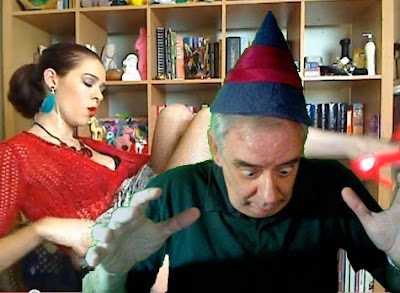Oops! Sorry Aaron. I hope what I said doesn't get you killed.
Wouldn't it be fun to go to the beach and get a funny caricature done like the one above? What a nice, clean line!
Aaron does what looks like acrylic portaits, too.
The man does what the best modern caricaturists do: he sees his subjects as weird, biological specimens. You see it in his two-man "friend" portraits, which always look like the love of a sea urchin for a flounder. I mean that as a compliment.
Friendship is one of the great mysteries of life. Two weird organisms (above) with different tastes and different physiology find each other and somehow just "gel." It's a strange and wonderful phenomenon and only caricature seems to capture it adequately.
Wonderful (above), just wonderful!
Asians (above) can be a challenge to draw. The linear eyes are first thing Europeans see, but if you draw them like that some Asians get offended. That's because they don't see themselves that way. Look at Manga which always portrays Japanese as having huge, wide-open, glassy eyes. What's a caricaturist to do?
I think Aaron has the right approach. Just draw what you see. At least it's honest, and maybe one day Asians won't be so touchy about it.
I love portraits where a big giraffe head (above) just leans in from the side. How do you like the arrangement of the teeth?
Above, another "biological specimen" portrait. You imagine David Attenburough describing the creature as a bottom feeder which uses its nose to stir up the sand, and its mouth to suck up the worms that live there. I'm guessing that the father of this technique was John K who watches animal shows on TV in order to understand humans better.
Very Nice (above)! I also like the way the chair comes off as an irregular-shaped cloth frame in this photo.
Probably these (above) were just-for-fun sketches, done at home. The task for a caricaturist is to retain this cartoony, class clown style even in a worked-up painting.
I could write a whole article about these last three pictures (above). They look primitive but are actually very sophisticated. It takes real comedic and graphic talent to simplify faces this way. It's hard to do that when your subject has paid you and is sitting right in front of you. In that situation you delete everything funny in an attempt to chase the likeness. The funniest pictures are always drawn the next day when you're on the scent of a remembered impression.
This reminds me of something caricaturist Marlo Meekins said. She said she didn't mind it when people moved a lot while she was sketching them. The movement made her focus on her impression of the subject, rather than fidelity to reality.
Anyway, great work Aaron!
Aaron's blog:
http://aaronphilby.blogspot.com/




















































